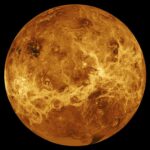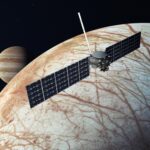30 April 2024

Rhode Island Convention Center
One Sabin Street
Providence, Rhode Island 02903
5 – 10 May 2024
Press contact:
Liza Lester, +1 (202) 777-7494, [email protected]
WASHINGTON — Media tips and events are available for the 2024 Astrobiology Science Conference (AbSciCon), sponsored by the American Geophysical Union (AGU), to be held in Providence, Rhode Island, 5 to 10 May 2024. The biennial conference brings together a diverse, international astrobiology community to share new research investigating life’s potential, from Earth’s extreme environments and distant past to our solar system’s icy moons and distant exoplanets.
In this advisory:
Press roundtable Q&A sessions
AGU Media Relations will live stream press roundtable events via Zoom Webinar and take questions from remote reporters. Panelists, related abstracts and Zoom Webinar access links are detailed in the online Press Center. The press password will be emailed to all press registrants for AbSciCon24, or email AGU Media Relations at [email protected] for assistance.
How Venus lost its water
Monday, 6 May 11:30 a.m. EDT
Billions of years ago, Venus may have harbored just as much water as Earth. Today, almost all of it has disappeared. How the planet lost its water remains a mystery. In a new study, which will be published 6 May in the journal Nature, researchers from the University of Colorado Boulder report that they’ve filled an important gap in this “water story on Venus.” The team will share its findings and describe their implications for Venus and planets across the galaxy. [Note: the related Nature paper is embargoed until 11:00 a.m. on 6 May. For more information, contact Daniel Strain, University of Colorado Boulder press office, [email protected]]
Does Europa, Jupiter’s icy moon, have the ‘right stuff’ to support life? How NASA’s Europa Clipper will help answer that question.
Tuesday, 7 May 11:30 a.m. EDT
NASA’s Europa Clipper’s main science goal is to determine whether there are places below the surface of Jupiter’s icy moon, Europa, that could support life. The mission’s detailed exploration of Europa will help scientists better understand the astrobiological potential of icy worlds beyond our planet. Members of NASA’s Europa Clipper team will be available to meet with journalists and answer questions about the mission’s science and engineering as it readies for launch in October 2024.
Tips for press
More about Venus:
- Oxygen loss and Venus’ transition from a wet to dry world: A review
- Venture to Venus: DAVINCI mission to learn more about the planet’s enigmatic origins and evolution
- Venus’ clouds have a mysterious light-absorbing molecule
- Reuniting Twins: Lessons from Venus Regarding Earth’s Future
- What kinds of planets hold on to habitable atmospheres?
More about Europa and our solar system’s icy worlds:
- Top tip: Wind Lake Cave National Park as an analogue for Europa
- How can icy worlds melt?
- Mapping out the search for life’s building blocks in Enceladus’ oceans
- One-in-three likelihood of living system on Enceladus right now
- How did Europa’s oceans evolve and what does that mean for habitability?
- Comets’ crashes on Ceres could have shaped its ocean chemistry
- Biosignatures of salt-loving viruses: analogs for life in icy moon brines
- Cryobots for ocean world exploration
- Outer icy moons host some weird ice under pressure
- Tiny, briny life: Habitability of salty ice pores
Panspermia and planetary protection:
- What Octavia Butler’s work can tell us about planetary protection–and sci fi’s role in science
- Hardy bacteria from spacecraft assembly rooms could survive in alien ocean brines
- Panspermia could succsesfully seed life on more than 100 habitable-zone worlds in the galaxy
Extremes of life on Earth
- Top tip: Some desert microorganisms are mysteriously UV-resistant. Antioxidants could be key
- Microbial communities found within Arctic, Antarctic ice may be metabolically active
- These extremophiles thrive in a salty Antarctic ice pond
- These extremophiles thrive in salty Antarctic ice pond part 2
- Could desert varnish be biologic in origin?
- A metagenomic exploration of cryptic sub-seafloor communities
- Microhabitats shape life at a the millimeter scale
- First natural occurrence of weird Martian rocks found on Earth
- This new extreme amoeba can survive in the hottest temperatures we know of
- Experiments reveal miniature carnage from massive impacts
Evolution of life’s toolbox on Earth
- Top tip: Prebiotic molecules could have left abiotic microfossils in geologic record
- Studying the exhalations of soil crusts for insight into first terrestrial ecosystems
- Oxygen could have driven turnover in Ediacaran biota
- Rethinking the “Great” Oxidation Event as “gradual” instead
- Could seasonal fluxes in oxygen levels have driven the rise of animals?
- Making life in a test tube without biochemistry
- Tracing the evolution of metabolisms on Earth reveals how our planet’s biosignatures would have changed over time
- Would a different origin of life still look like Earth life’s use of amino acids? A review
- Are Earth’s amino acids the best, or just what we have?
- Micelles are the strongest candidate for the “protocell” critical for Earth life evolution
- Rubisco, a key molecule for Earth life, is more flexible than we thought
- How long would t-RNA last in shallow freshwater ponds on early Earth?
- The color of life: a comprehensive spectrum of biopigments
- Would the critical citric acid cycle be different on other planets?
- “Evolutionary mineralogy” documents ties between rocks and life
- Cosmic rays could explain the consistent handedness of biological molecules
- Machine learning reconstructs shapes of life’s earliest proteins
What makes a habitable zone:
- Top tip: Pumice islands could support chemical evolution on water worlds
- Top tip: Can life exist outside gravity wells?
- How small can a planet be and still be considered habitable?
- Habitability could still arise after loss of original atmosphere
- Top tip: Slowing planetary rotation enhances marine habitability on Earth and beyond
- Weird worlds: what would life be like on planets with extreme seasons?
- If the Earth was tilted more or rotated slowly, its habitability would be different
- Where are the (in)habitable zones on planets with day/night sides?
- A single-continent planet wouldn’t have much habitable area
- How continents shape the potential for life in oceans
- MIRECLE mission would characterize planets’ habitability around M-stars
- Luyten’s Star more promising for hosting habitability than thought
- Could life have first evolved in the Trappist 1 system?
- Planets’ magnetospheres may protect moons from solar wind’s erosive power
- Wanted: Cozy exoplanet with “warm little ponds”
- Habitable zone inner edge as key target for wet worlds
Can we see life from 12.5 parsecs? Looking for biosignatures on planets far far away:
- SESSION: Prebiotic chemistry or biosignature? Navigating the maze of abiogenesis for space exploration III Oral
- Biosignature-searcher to launch with Europa Clipper in October 2024
- Searching for biosignatures in Trappist 1 system with JWST
- A new, resilient “fingerprint of life” from meteorites
- Alien song as a potential biosignature: Insights from human and whale song patterns
- Whale sounds show us that we need to be more creative in listening for signs of life
- Whales blow bubble rings. We should look for similar signatures in space
But can we see climate change from 12.5 parsecs? Looking for technosignatures:
- How long will Veeger last? What the decay rate of artifacts on the Moon means for technosignatures
- Could we detect spacecraft traveling near the speed of light?
- Can we see your climate change?
- Solar panels could be technosignatures–but would they be too small to see?
- Listening broadly: How we’ll recognize aliens
- The field of “Future Studies” and what our technosignatures could evolve to be
Space voyages for humans:
- Top tip: What we’re packing for space: Microbes to create soil for Moon farming
- Top tip: Analogue missions on Earth pave future for differently abled astronauts
- What we’re packing for space: Space tomatoes!
- What we’re packing for space: Magnesium-resilient crops
- What we’re packing for space: Out-of-this-world oysters
- Techniques and accommodations for disabled astronauts
- Astrobiology education for incarcerated youth in the Seattle area
- How to break the news about life beyond Earth part 1: microbes vs. ET
- How to break the news about life beyond Earth part 2: cases studies in science anxiety
Life on Mars:
- To find Martian life, drill into ice
- Using astroecology to find landing sites and habitable regions on Mars
- More than 100 teams compete in 16th year of University Rover Challenge
Bennu — Latest results from the asteroid sample:
Press registration
Staff, freelance and student journalists are eligible to apply for complimentary press registration through the end of the conference. Press officers and institutional writers covering the meeting are also eligible. Learn about AGU’s press eligibility requirements.
Reporters and press officers interested in press registration should email [email protected]. Please include a link to your institution’s staff page, byline or masthead listing your name and position. Freelancers should provide a link to a portfolio or links to at least three bylined science news stories published in the last 12 months. Walk-in press registration will be accepted.
Media access to the meeting is issued at the discretion of AGU Media Relations. All press registrants must provide credentials regardless of whether they have attended in the past. Please email us at [email protected] if you have a question about eligibility, what group you should register under, or other conference questions.
Programming and online access
AbSciCon24 will host daily online discussion sessions at 10 am EDT and a selection of hybrid sessions. Recording of in-person talks will be available 72 hours after the events. The full scientific program is available now. Find hybrid in-person and online sessions by navigating to “browse by day” and select “hybrid” at the top.
Media registrants receive, at no charge, access to all scientific sessions and an on-site press room, along with press events. Some events and activities, including but not limited to invitation-only events and communications workshops, are not open to press registrants.
Save the date for more 2024 science
- Water Science Conference, 23 – 28 June in Saint Paul, Minnesota, USA
- AGU24 Annual Meeting, 9 – 13 December in Washington, D.C., USA
###
AGU (www.agu.org) is a global community supporting more than half a million advocates and professionals in Earth and space sciences. Through broad and inclusive partnerships, AGU aims to advance discovery and solution science that accelerate knowledge and create solutions that are ethical, unbiased and respectful of communities and their values. Our programs include serving as a scholarly publisher, convening virtual and in-person events and providing career support. We live our values in everything we do, such as our net zero energy renovated building in Washington, D.C. and our Ethics and Equity Center, which fosters a diverse and inclusive geoscience community to ensure responsible conduct.

